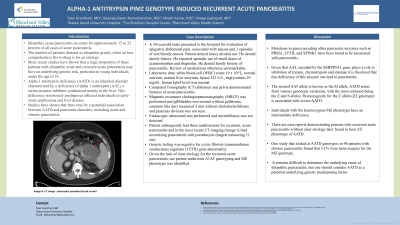Sunday Poster Session
Category: Biliary/Pancreas
P0081 - Alpha-1 Antitrypsin PiMZ Genotype-Induced Recurrent Acute Pancreatitis
Sunday, October 22, 2023
3:30 PM - 7:00 PM PT
Location: Exhibit Hall

Has Audio
- TG
Tyler Grantham, MD
Staten Island University Hospital
Staten Island, NY
Presenting Author(s)
Tyler Grantham, MD1, Rajarajeshwari Ramachandran, MD2, Vikash Kumar, MD2, Vinaya Gaduputi, MD3
1Staten Island University Hospital, Staten Island, NY; 2Brooklyn Hospital Center, Brooklyn, NY; 3Blanchard Valley Health System, Findlay, OH
Introduction: Studies have shown that a large proportion of patients with idiopathic acute recurrent pancreatitis may have an underlying genetic risk. Alpha-1 antitrypsin (A1AT) deficiency has been shown to have a potential association with pancreatitis. In this case report, we present a unique case of recurrent acute pancreatitis in a patient found to have the MZ phenotype of A1AT.
Case Description/Methods: A 34-year-old male presented to the hospital for evaluation of epigastric abdominal pain, associated with nausea and 3 episodes of non-bloody emesis. Patient denied heavy alcohol use. He reported sporadic use of small doses of acetaminophen and ibuprofen. Laboratory data: white blood cell (WBC) count 19 x 10⁹/L, normal calcium, normal liver enzymes, lipase 332 U/L, triglycerides 29 mg/dL. Computed Tomography (CT) abdomen and pelvis demonstrated features of acute pancreatitis. Magnetic resonance cholangiopancreatography (MRCP) was performed and gallbladder was normal without gallstones, common bile duct measured 3 mm without choledocholithiasis and pancreas divisum was not seen. Given no clear etiology for acute pancreatitis, endoscopic ultrasound was performed and microlithiasis was not detected. Serum IgG4 level was normal. He denied family history of pancreatitis.
Patient subsequently had three readmissions for recurrent, acute pancreatitis and in the most recent CT imaging (image A) had necrotizing pancreatitis with pseudocysts (largest measuring 11 cm). Genetic testing was negative for cystic fibrosis transmembrane conductance regulator (CFTR) gene abnormality. There are rare cases of acute pancreatitis from acetaminophen and naproxen use, however he did not use these medications following the initial presentation. Given the lack of clear etiology for the recurrent acute pancreatitis, our patient underwent A1AT genotyping and MZ phenotype was identified. There have been reports of possible association of A1AT deficiency and recurrent acute pancreatitis/chronic pancreatitis. Patient has been advised to follow up as an outpatient to undergo additional workup such as Celiac disease serologies and genetic testing (for SPINK1).
Discussion: A1AT plays a role in the inhibition of trypsin, chymotrypsin and elastase in the pancreas. Homozygosity for the Z allele (ZZ genotype) is associated with severe A1AT deficiency and has been recognized as a cause of recurrent acute pancreatitis. There are some publications that associate MZ phenotype with pancreatitis.

Disclosures:
Tyler Grantham, MD1, Rajarajeshwari Ramachandran, MD2, Vikash Kumar, MD2, Vinaya Gaduputi, MD3. P0081 - Alpha-1 Antitrypsin PiMZ Genotype-Induced Recurrent Acute Pancreatitis, ACG 2023 Annual Scientific Meeting Abstracts. Vancouver, BC, Canada: American College of Gastroenterology.
1Staten Island University Hospital, Staten Island, NY; 2Brooklyn Hospital Center, Brooklyn, NY; 3Blanchard Valley Health System, Findlay, OH
Introduction: Studies have shown that a large proportion of patients with idiopathic acute recurrent pancreatitis may have an underlying genetic risk. Alpha-1 antitrypsin (A1AT) deficiency has been shown to have a potential association with pancreatitis. In this case report, we present a unique case of recurrent acute pancreatitis in a patient found to have the MZ phenotype of A1AT.
Case Description/Methods: A 34-year-old male presented to the hospital for evaluation of epigastric abdominal pain, associated with nausea and 3 episodes of non-bloody emesis. Patient denied heavy alcohol use. He reported sporadic use of small doses of acetaminophen and ibuprofen. Laboratory data: white blood cell (WBC) count 19 x 10⁹/L, normal calcium, normal liver enzymes, lipase 332 U/L, triglycerides 29 mg/dL. Computed Tomography (CT) abdomen and pelvis demonstrated features of acute pancreatitis. Magnetic resonance cholangiopancreatography (MRCP) was performed and gallbladder was normal without gallstones, common bile duct measured 3 mm without choledocholithiasis and pancreas divisum was not seen. Given no clear etiology for acute pancreatitis, endoscopic ultrasound was performed and microlithiasis was not detected. Serum IgG4 level was normal. He denied family history of pancreatitis.
Patient subsequently had three readmissions for recurrent, acute pancreatitis and in the most recent CT imaging (image A) had necrotizing pancreatitis with pseudocysts (largest measuring 11 cm). Genetic testing was negative for cystic fibrosis transmembrane conductance regulator (CFTR) gene abnormality. There are rare cases of acute pancreatitis from acetaminophen and naproxen use, however he did not use these medications following the initial presentation. Given the lack of clear etiology for the recurrent acute pancreatitis, our patient underwent A1AT genotyping and MZ phenotype was identified. There have been reports of possible association of A1AT deficiency and recurrent acute pancreatitis/chronic pancreatitis. Patient has been advised to follow up as an outpatient to undergo additional workup such as Celiac disease serologies and genetic testing (for SPINK1).
Discussion: A1AT plays a role in the inhibition of trypsin, chymotrypsin and elastase in the pancreas. Homozygosity for the Z allele (ZZ genotype) is associated with severe A1AT deficiency and has been recognized as a cause of recurrent acute pancreatitis. There are some publications that associate MZ phenotype with pancreatitis.

Figure: Image A: CT image - pancreatic pseudocyst (red arrow)
Disclosures:
Tyler Grantham indicated no relevant financial relationships.
Rajarajeshwari Ramachandran indicated no relevant financial relationships.
Vikash Kumar indicated no relevant financial relationships.
Vinaya Gaduputi indicated no relevant financial relationships.
Tyler Grantham, MD1, Rajarajeshwari Ramachandran, MD2, Vikash Kumar, MD2, Vinaya Gaduputi, MD3. P0081 - Alpha-1 Antitrypsin PiMZ Genotype-Induced Recurrent Acute Pancreatitis, ACG 2023 Annual Scientific Meeting Abstracts. Vancouver, BC, Canada: American College of Gastroenterology.
